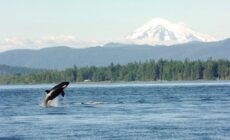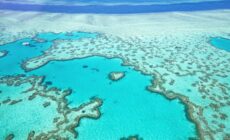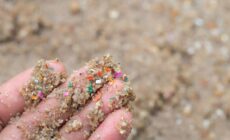Shipping
The amount of air pollution produced by ocean-going vessels is staggering. These large, ocean-going ships operate on diesel engines the size of a single-family home, and most burn “bunker” fuel, which is cheap, but much more polluting and climate-warming than fuels used to power vehicles. Bunker fuel contains high concentrations of toxic compounds banned from use in most other industrial and consumer applications.
As global trade increases, global shipping is expected to double within the next decade, bringing shipping pollution to new highs. EPA estimates that emissions from ocean-going vessels will double their contributions to the national mobile source inventory of sulfur oxides and quadruple particulate matter — both of which are major health threats. Increased ship emissions not only degrade air quality, but also contribute to global warming, ocean acidification and eutrophication of waterways.
Friends of the Earth works at the local and state levels to strengthen port regulations to protect local communities and waters, to enact health-protective national and international shipping standards, and to achieve global warming reductions from ocean-going vessels in order to attain pollution reductions worldwide.
A coalition of national and community-based organizations launched the Clean Ports Report Card Project — a first-of-its-kind accountability tool, grading major U.S. ports on their progress to cut emissions, increase transparency, and collaborate with communities.
NEW YORK — The Port of New York and New Jersey was recognized as a “Healthier Harbor” in a new national Clean Ports Report Card released today. earning a high score for its efforts to modernize and clean up its operations through emissions…
Advocates call for more community collaboration; fragmented efforts and a lack of an emissions inventory leave communities at risk

In a historic breakthrough, the Inuit Circumpolar Council (ICC) has become the first Indigenous organization ever granted permanent consultative status at the International Maritime Organization (IMO).

Five years of environmental activism will clean the state’s waterways, protect public health, and boost local economy. This is a major win for both Washington and our planet.

The International Maritime Organization (IMO) established PSSAs to define vulnerable marine areas that could benefit from protection.

A major source of ocean microplastics, tiny plastic pellets are a large problem in our marine environments.

by Tyler R. Johnson, Ports and Community Engagement Assistant and Terrance L. Bankston, Senior Ports and Freight Campaigner
Contributors: Erica Beverett, Community Engagement Organizer, Parents Engaging Parents New Jersey (PEPNJ) & Altorice Frazier, Port Campaigner - Northeast, Pacific Environment
Photos are courtesy of: Friends of the Earth and Parents Engaging…
-
DownloadOil Tanker Info Sheet
-
DownloadNorthwest Campaign Info Sheet
-
Learn MoreTar sands/Dilbit Crude Oil Movements Within the Salish Sea
